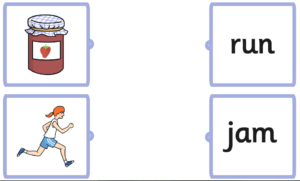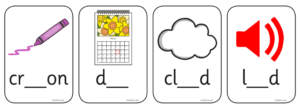02 March 2018
Focus : homophones
This week for spelling, please learn the following words which are all homophones. You need to write one sentence for each word, using the correct homophone.
1. meet
2. meat
3. here
4. hear
5. fair
6. fare
7. knot
8. not
02 March 2018
This week’s spelling homework is a list of spellings to be tested on Thursday 08 March.
In English, we have been looking at making singular words (only one) into plural words (more than one) by add s, es (when the word ends in sh, ch, s, ss, z, zz) or changing the y to ies (when the y is on its own – not when it is part of a digraph e.g oy, ey, ay).
Group 1
foxes, toys, churches, balls, buses
Group 2
foxes, toys, churches, balls, buses, chairs, wishes, boxes
Group 3
foxes, toys, churches, balls, buses, parties, fairies, monkeys, donkeys
23 February 2018
This week’s spelling homework is a spelling task and is due on Thursday 01 March.
Year 1 have a High Frequency Words word search to complete. When completed, can the children write a sentence using one of the words they have found?
Year 2 have a worksheet to practice changing nouns from singular (only one) to plural (more than one). The children have 3 rules to follow in this activity in order to change the noun to plural: just add s, add es (if the noun ends in s, ss, ch, sh, z, zz) or drop the y and add ies.
23 February 2018
Focus : words we have learnt
This week for spelling, please practise the following list of words using the activities at the back of your book.
These are all words we have learnt in spelling lessons and in work throughout the year so far.
- recent
- surprise
- special
- decided
- February
- certainly
- addition
- because
- caught
- stopped
- cries
- making
23 February 2018
We’re revising root words and pre-fixes this week. Please choose an activity from the grid and complete using the words from the spelling list below.
| disappointed | overseas |
| dissatisfied | overrule |
| dissimilar | overreact |
| unsure | impatient |
| unnecessary | immobile |
| unnatural | immovable |
02 February 2018
This week’s spellings is a spelling task and is due on Thursday 08 February.
Group 1
Use your phonics to match the pictures to the words.

Group 2
Write the correct phase 5 sound into the space for each word.

Group 3 and 4
Practice your contractions (where two or more words are put together and leaving out some of the letters or sounds) and homophones (two or more words having the same pronunciation but different meanings and/or spellings).


02 February 2018
| Complete a spelling activity from the spelling grid.
Words linked to the topic ‘Life Forces’. |
|
| reptile | extinct |
| amphibian | indigenous |
| mammal | omnivore |
| environment | herbivore |
| cold-blooded | predator |
02 February 2018
Focus : apostrophes for contraction and omission
A contraction is when two words are ‘squashed’ into one. For example:
- do not – don’t
- would not – wouldn’t
When two words are joined together this is called a contraction. An apostrophe is used to show where a letter has been missed out when the words have been contracted.
Task: Find ten different words which use apostrophes for contraction and use them in sentences. For example:
- I don’t know what to buy for lunch.
- The wizard wouldn’t deliberately kill the dragon.
Extra challenge: Use the three different spellings of there in one sentence.
26 January 2018
This week, the spellings are to learn – ready to be tested on Thursday 1 February. Have a look in your child’s book for which group they are in.
Group 1
he, she, the, then, they
Group 2
me, he, she, the, then, they, there, this
Group 3
people, through (I go through the field..), threw (I threw the ball…), these, laughed
Group 4
people, through (I go through the field..), threw (I threw the ball…), these, laughed, suddenly, because, different
26 January 2018
Please learn your spellings for a test next week.
| Complete a spelling activity from the spelling grid.
Words from the Y5/6 spelling list beginning with ‘c’ |
|
| committee | conscience |
| community | conscious |
| communicate | controversy |
| competition | criticise (critic+ise) |
| correspond | curiosity |